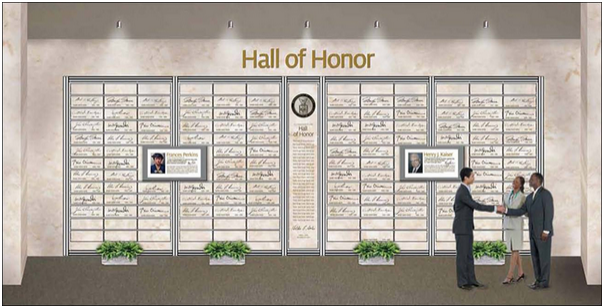By Nathan Mehrens
Like thousands of government activities and programs that many people are probably not familiar with, the U.S. Department of Labor has a “Hall of Honor.” Its ostensible purpose is “to honor those Americans whose distinctive contributions in the field of labor have elevated working conditions, wages, and over-all quality of life of America’s working families.” It was previously called the “Hall of Fame”; but, for some reason, the Obama Administration decided to change the name to “Hall of Honor.”
The 2015 inductee was the late Sen. Ted Kennedy.
It’s surprising that two other well-known Kennedys, John F. and Robert F., were not inducted at the same time as well. After all, these two made significant contributions to legislation that actually helps the American worker, the federal Landrum-Griffin Act, the Labor-Management Reporting and Disclosure Act of 1959 (LMRDA).
In the late 1950s, the U.S. Congress began a long series of hearings to investigate corruption in organized labor. Robert F. Kennedy was chief counsel for the Select Committee on Improper Activities in the Labor or Management Field (McClellan Committee), the committee tasked with this investigation. He later wrote a book on his experiences titled The Enemy Within, The McClellan Committee’s Crusade Against Jimmy Hoffa and Corrupt Labor Unions.
Over the course of two years, the committee held hearings on 270 days, calling over 1,500 witnesses to testify. In the end, a legislative solution was chosen which provided for union financial transparency, provided protections for union members, including the right to vote for their officers, and gave enforcement powers to the U.S. Department of Labor to investigate and prosecute crimes against workers.
Showing how much times have changed, the bill that became the LMRDA was passed with 95 votes in the U.S. Senate and 352 in the U.S. House. No labor-related legislation today enjoys such wide bipartisan support.
In April of 1959, then Senator John F. Kennedy presented the report on S.1555, the Senate version of the bill that became the LMRDA. The report noted that the money of a labor organization belongs to the members and stated, “The members who are the real owners of the money and property of the organization are entitled to a full accounting of all transactions involving their property.” The report further stated,
The Committee is confident that union members armed with adequate information and having the benefit of secret elections, as provided in title III of this bill, would rid themselves of untrustworthy or corrupt officers. In addition, the exposure to public scrutiny of all vital information concerning the operation of trade unions will help deter repetition of the financial abuses disclosed by the McClellan committee.
Unfortunately, Sen. Ted Kennedy became a harsh critic of union financial transparency and the Labor Department’s efforts to fulfill the LMRDA’s mandate. In a 2003 hearing, he stated, “The burdensome aspects of these provisions lead one to believe that the principal focus of the Department has been more in terms of sort of hassling and harassing workers and workers’ leaders than trying to be helpful and responsive to some of their needs.” At the time, the Department was working to update the financial transparency regulations in order to, as Sen. John F. Kennedy said, provide to union members a “full accounting of all transactions involving their property.”
Despite Sen. Ted Kennedy’s efforts, these updates were accomplished and have been useful in uncovering union corruption and enabling union members to “rid themselves of untrustworthy or corrupt officers.” For instance, the reports now required were used by Paul Pringle, a reporter for the L.A. Times, to uncover financial improprieties committed by Tyrone Freeman, then president of a large SEIU local in California. Pringle’s review of these reports lead to Freeman’s downfall. Freeman was stripped of his office, indicted, and convicted of numerous charges of embezzlement, fraud, making false statements to a federally-insured institution, and filing false tax returns.
The contributions of Robert F. Kennedy and John F. Kennedy to creating the law that enables reporters like Pringle, as well as union members and the public at large, to uncover union corruption should be recognized next time the Labor Department needs new inductees to their Hall of Honor.
Perhaps next year these two will be added alongside Sen. Ted. Kennedy.
Nathan Mehrens is President of Americans for Limited Government Foundation.







